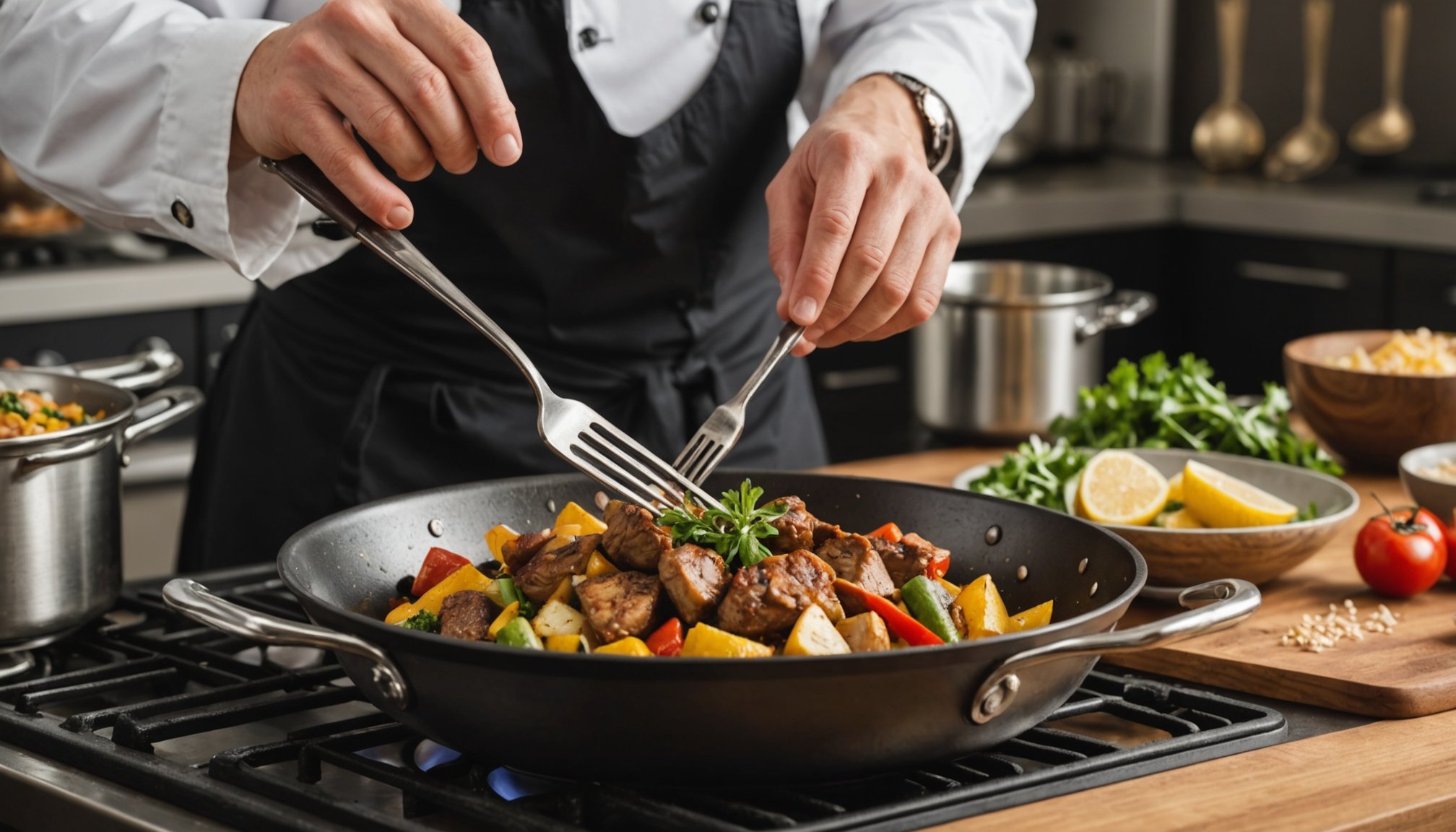Unlock Culinary Mastery: Essential Cooking Tips for a Prosperous Year
As we step into a new year, many of us aspire to enhance our culinary skills, whether to impress family and friends, to explore new flavors, or simply to make mealtime more enjoyable. Cooking is not just about following recipes; it’s an art that requires practice, patience, and a willingness to learn. Here’s a comprehensive guide to help you unlock your culinary potential and make the most of your time in the kitchen.
Starting Your Culinary Journey
Embrace Simple Recipes
When venturing into the world of cooking, it’s crucial to start with simple, easy-to-follow recipes. These recipes typically require minimal ingredients and basic techniques, helping you build confidence and gradually develop your skills. For instance, beginning with dishes like pasta with marinara sauce, grilled chicken, or a hearty vegetable soup can lay the foundation for more complex cooking endeavors[1].
Also read : Essential Cooking Tips and Clever Tricks You Can’t Miss
Watch and Learn
Watching cooking shows and online tutorials is an excellent way to get inspired and learn new techniques. Platforms like YouTube, Netflix, and cooking blogs offer a plethora of instructional videos that cater to all skill levels. Observing professional chefs and home cooks can provide valuable insights and spark your creativity. Chef Jean-Pierre, for example, shares his decades of experience through detailed videos on essential kitchen tools and techniques, making cooking more accessible and enjoyable[2].
Join a Cooking Class
Taking a cooking class is a fantastic way to learn hands-on from experienced chefs. Whether in-person or online, classes provide structured learning, personalized feedback, and the opportunity to ask questions. You can find classes that focus on specific cuisines, techniques, or dietary preferences. This interactive learning environment helps you conquer the kitchen with confidence and precision[1].
Topic to read : Transformative Ingredients: The Ultimate Game-Changers You Need to Know
Essential Kitchen Tools
Having the right tools in your kitchen can make a significant difference in your cooking experience. Here are some must-have kitchen tools that every home cook should consider:
- Piano Whisk: Ideal for mixing sauces and dressings.
- Paring Knife: Perfect for peeling and coring fruits and vegetables.
- Scraper/Chopper: Useful for scraping the sides of bowls and chopping ingredients.
- Stainless Steel Fry Pan: A versatile pan for frying, sautéing, and cooking a variety of dishes.
- Tongs: Great for handling food in pans or on the grill.
- Instant Read Thermometer: Essential for ensuring your meat is cooked to the perfect temperature.
- Potato Ricer: For making fluffy mashed potatoes and other root vegetables.
- Single Mesh Strainer: Useful for straining soups, sauces, and pasta.
- Slicer: Ideal for slicing meats, cheeses, and vegetables evenly.
- Kitchen Shears: Handy for various kitchen tasks, from cutting herbs to opening packaging.
- Cutting Board: A must-have for preparing ingredients safely and hygienically.
- Non-stick Cookware: Perfect for cooking delicate foods without sticking.
- In-oven Thermometer: Ensures your oven is at the correct temperature.
- Meat Tenderizer: Helps in making tougher cuts of meat more palatable.
- Honing Steel: For maintaining the sharpness of your knives[2].
Mastering Cooking Techniques
Knife Skills
Knife skills are fundamental for any cook. Mastering how to chop, dice, slice, and mince ingredients efficiently and safely is crucial. Here are some tips to improve your knife skills:
- Choose the Right Knife: Different knives are designed for specific tasks. For example, a chef’s knife is versatile and ideal for most chopping tasks, while a paring knife is better for peeling and coring fruits and vegetables.
- Maintain Your Knives: Regularly sharpen and hone your knives to keep them in good condition.
- Practice Cutting Techniques: Practice different cutting techniques such as the “rocking motion” for chopping and the “push-pull” motion for slicing[4].
Cooking Methods
Understanding various cooking methods is key to culinary mastery. Here are some essential techniques to try:
- Grilling: Perfect for adding a smoky flavor to meats and vegetables. Ensure your grill is preheated, and use an instant-read thermometer to check the internal temperature of your meat.
- Frying: Whether deep-frying or pan-frying, this method requires precise temperature control. Use a thermometer to ensure your oil is at the right temperature.
- Sauteing: A quick and versatile method for cooking a variety of ingredients. Use a hot pan with a small amount of oil, and stir frequently to prevent burning[3].
Exploring Different Cuisines
Global Flavors and Techniques
Exploring different cuisines can broaden your culinary horizons and introduce you to new flavors and techniques. Here are a few cuisines to consider:
- Mexican Cuisine: Known for its bold flavors, Mexican cuisine often includes ingredients like mole sauce, jalapeños, and cilantro. Try making dishes like tacos, enchiladas, or chiles rellenos.
- Japanese Cuisine: Characterized by delicate and intricate techniques, Japanese cuisine includes dishes like sushi, bento boxes, and miso soup. Experiment with ingredients like soy sauce, wasabi, and sesame oil.
- Indian Cuisine: Rich in spices and diverse flavors, Indian cuisine offers a wide range of dishes like curries, tandoori chicken, and naan bread. Explore the use of spices like turmeric, cumin, and coriander.
- French Cuisine: Known for its refined techniques and comforting dishes, French cuisine includes stews, pastries, and delicacies like escargots and ratatouille. Practice making sauces like béarnaise and hollandaise[1].
Making Cooking a Fun Hobby
Cooking with Friends and Family
Cooking can be a social and enjoyable activity when done with friends and family. Here are some tips to make it more fun:
- Collaborate on Recipes: Choose a recipe together and work as a team to prepare it. This can be a great bonding experience and allows everyone to contribute their skills and ideas.
- Share Tips and Tricks: Exchange cooking tips and tricks with each other. This can help everyone improve their cooking skills and discover new techniques.
- Enjoy the Results Together: The best part of cooking with others is enjoying the meal together. Set the table, pour some wine, and relish the fruits of your labor[1].
Keeping a Cooking Journal
Documenting your cooking journey can be incredibly rewarding. Here’s why you should keep a cooking journal:
- Track Your Progress: Write down the recipes you’ve tried, the adjustments you made, and notes on what worked or didn’t. This helps you track your progress and remember successful dishes.
- Learn from Mistakes: Documenting your mistakes can help you learn from them. Analyze what went wrong and how you can improve next time.
- Inspiration and Ideas: A cooking journal can also serve as a source of inspiration. Flip through your entries to find ideas for new dishes or to revisit old favorites[1].
Practical Insights and Actionable Advice
Setting Cooking Goals
Setting small, achievable cooking goals can keep you motivated and engaged. Here are some examples of cooking goals you might consider:
- Master a New Recipe Each Week: Choose a new recipe each week and aim to perfect it. This could be anything from a simple soup to a complex dessert.
- Try a New Cuisine Each Month: Explore different cuisines by trying new recipes and ingredients each month.
- Perfect a Specific Cooking Technique: Focus on mastering a particular technique, such as making the perfect soufflé or cooking the ideal steak[1].
Problem Solving in the Kitchen
Every cook encounters problems in the kitchen, whether it’s a dish that didn’t turn out as expected or an ingredient that’s missing. Here are some tips for problem solving:
- Stay Calm: Panicking can lead to more mistakes. Stay calm and think through the problem logically.
- Substitute Ingredients: If you’re missing an ingredient, think about what you can substitute it with. For example, if a recipe calls for heavy cream but you only have milk, you can use milk with a bit of butter to achieve a similar consistency.
- Adjust Cooking Times: If your dish is not cooking as quickly as expected, adjust the cooking time accordingly. Use a thermometer to ensure your meat is cooked to the right temperature[3].
Customer Reviews and Chef Recommendations
What Chefs and Home Cooks Say
Here are some insights from chefs and home cooks that can inspire and guide you:
- “Cooking is not just about following recipes; it’s about understanding the techniques and ingredients. Practice regularly, and don’t be afraid to try new things.” – Chef Jean-Pierre
- “The key to mastering cooking is patience and persistence. Don’t get discouraged by failures; they are part of the learning process.” – Home Cook, New York
- “Investing in quality kitchen tools makes a big difference. It’s not just about the cost; it’s about the durability and performance.” – Chef Jarek[2][5].
Unlocking culinary mastery is a journey that requires dedication, practice, and a passion for learning. By starting with simple recipes, mastering essential cooking techniques, exploring different cuisines, and making cooking a fun and social activity, you can elevate your culinary skills significantly. Remember to invest in quality kitchen tools, keep a cooking journal, and set achievable cooking goals to stay motivated.
As you embark on this culinary adventure, always keep in mind the words of Chef Jean-Pierre: “Cooking is a joy that should be shared with others. Enjoy the process, and don’t be afraid to try new things.” With these tips and a bit of practice, you’ll be well on your way to conquering the kitchen and creating delicious dishes that will impress anyone.
Table: Essential Cooking Techniques and Tools
| Cooking Technique | Description | Required Tools |
|---|---|---|
| Grilling | Cooking over direct heat to add a smoky flavor. | Grill, Instant Read Thermometer |
| Frying | Cooking in hot oil to achieve a crispy exterior. | Fry Pan, Thermometer |
| Sauteing | Quick cooking in a hot pan with minimal oil. | Saute Pan, Spatula |
| Baking | Cooking in an oven using dry heat. | Oven, Baking Sheets |
| Knife Skills | Chopping, slicing, and dicing ingredients. | Chef’s Knife, Paring Knife, Cutting Board |
Detailed Bullet Point List: Tips for Mastering Knife Skills
- Choose the Right Knife: Different knives are designed for specific tasks. For example, a chef’s knife is versatile and ideal for most chopping tasks, while a paring knife is better for peeling and coring fruits and vegetables.
- Maintain Your Knives: Regularly sharpen and hone your knives to keep them in good condition.
- Practice Cutting Techniques: Practice different cutting techniques such as the “rocking motion” for chopping and the “push-pull” motion for slicing.
- Use the Correct Grip: Hold the knife with a firm but not overly tight grip. The blade should be controlled by the fingers and wrist.
- Cut on a Stable Surface: Always cut on a stable, flat surface to prevent accidents.
- Keep Your Fingers Curled: Keep your fingers curled under and out of the way of the blade to avoid injury.
- Practice Regularly: The more you practice, the more comfortable and proficient you will become with your knife skills[4].
By following these tips, guides, and recommendations, you’ll be well-equipped to start your culinary journey and make the most of your time in the kitchen. Happy cooking











